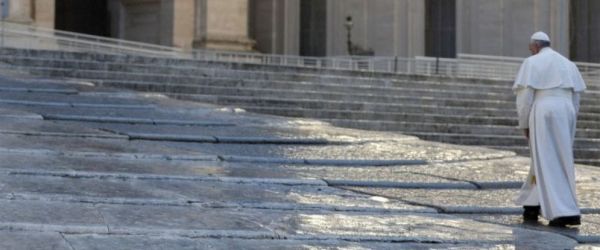Gospel tells us — in St Luke’s narrative — of the call of Jesus’ first disciples (5:1-11). The event takes place in the context of everyday life: there are several fishermen on the shore of the lake of Galilee, who, after working all night and catching nothing, are washing and arranging their nets. Jesus gets into one of the boats, that of Simon, called Peter, whom he asks to put out a little from the shore, and he starts to preach the Word of God to the crowd of people who had gathered. When he is finished speaking, he tells them to put out into the deep and cast the nets. Simon had previously met Jesus and felt the prodigious power of his word. Therefore, he responds: “Master, we toiled all night and took nothing! But at your word I will let down the nets” (v. 5). And this faith of his did not disappoint: indeed, the nets filled with so many fish that they nearly broke (cf. v. 6). Facing this extraordinary event, the fishermen are greatly astonished. Simon Peter throws himself at Jesus’ feet, saying: “Depart from me, for I am a sinful man, O Lord” (v. 8). That prodigious sign convinces him that Jesus is not only a formidable master whose word is true and powerful, but he is the Lord, he is the manifestation of God. For Peter this close presence brings about a strong sense of his own pettiness and unworthiness. From a human point of view, he thinks that there should be distance between the sinner and the Holy One. In truth, his very condition as a sinner requires that the Lord not distance Himself from him, in the same way that a doctor cannot distance himself from those who are sick.
Jesus’ response to Simon Peter is reassuring and decisive: “Do not be afraid; henceforth you will be catching men” (v. 10). Once again the fisherman of Galilee, placing his trust in this word, leaves everything and follows the one who has become his Lord and Master. Simon’s workmates, James and John, do the same. This is the logic that guides Jesus’ mission and the mission of the Church: go in search, “fish” for men and women, not to proselytize, but to restore full dignity and freedom to all, through the forgiveness of sins. This is the essential point of Christianity: to spread the free and regenerative love of God, with a welcoming and merciful attitude toward everyone, so that each person can encounter God’s tenderness and have the fullness of life. Here, in a particular way, I think of confessors: they are the first who must give the Father’s mercy, following Jesus’ example, as did the two holy Brothers, Fr Leopold and Padre Pio.
Today’s Gospel challenges us: do we know how to truly trust in the Word of the Lord? Or do we let ourselves become discouraged by our failures? In this Holy Year of Mercy we are called to comfort those who feel they are sinners, unworthy before the Lord, defeated by their mistakes, by speaking to them the very words of Jesus: “Do not be afraid. The Father’s mercy is greater than your sins! It is greater, do not be afraid!”. May the Virgin Mary help us to ever better understand that being disciples means placing our feet in the footsteps left by the Master: they are the footprints of divine grace that restore life for all.
[Pope Francis, Angelus 7 February 2016]












